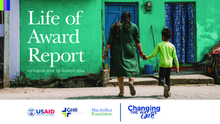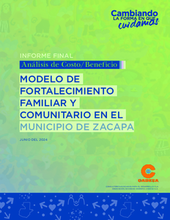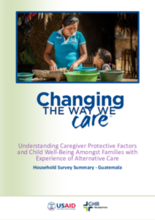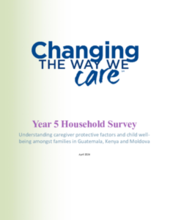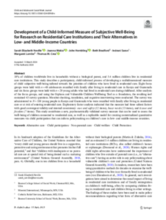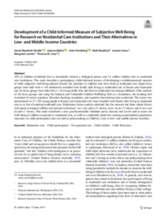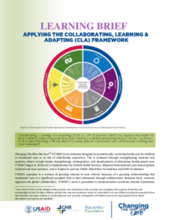This country page features an interactive, icon-based data dashboard providing a national-level overview of the status of children’s care and care reform efforts (a “Country Care Snapshot”), along with a list of resources and organizations in the country.
demographic_data
childrens_living_arrangement
children_living_without_bio
adoption
key_stakeholders
Key Stakeholders
Add New DataOther Relevant Reforms
Add New Datadrivers_of_institutionalisation
Drivers of Institutionaliziation
Add New Datakey_research_and_information
Key Data Sources
Add New DataPrevalence and number of children living in institutional care: global, regional, and country estimates
Reglamento de la Procuraduría de la Niñez y la Adolescencia de la Procuraduría General de la Nación
Revisión del gasto público asociado al cuidado de la niñez y adolescencia en Guatemala (2015 - 2019)
Acknowledgements
Data for this country care snapshot was contributed by a consultant with Maestral International and partners at Changing the Way We Care.
Displaying 11 - 20 of 161
The Changing the Way We Care℠ (CTWWC) Life of the Award Report highlights the initiative’s global efforts to promote safe, nurturing family care for children. Since 2018, CTWWC has been driving care reform in countries like Guatemala, Kenya, and Moldova, while supporting smaller projects in Haiti and India.
Guatemala, con una población en aumento que proyecta alcanzar los 17.8 millones de habitantes para 2024, enfrenta serios desafíos sociales y económicos, especialmente en áreas vulnerables como el municipio de Zacapa.
In Guatemala, the survey in 2023 targeted all families who had participated in a case management process with CTWWC due to a reintegrating child or a child identified as at risk of separation, as well as a sample of households where the caregiver had attended a parenting school.
Guatemala’s government has given temporary residency to 207 Mexicans, mostly children, on humanitarian grounds, after they fled across the border last week to escape drug violence.
During this webinar, participants will focus on identifying effective strategies that support local organizations and employ a “whole family” or “two-generation” approach to early childhood development and protection for children on the move and their families.
The Changing the Way We Care (CTWWC) initiative conducted its Year 5 Household Survey as part of its commitment to building evidence around outcomes for children and families in the context of care reform. The second round of this survey in Kenya and Guatemala, and first round in Moldova, aimed to understand the impact of CTWWC interventions on children and families transitioning from residential care to family-based alternatives or receiving support to prevent separation.
This study describes a participatory, child-informed process of developing a multidimensional measure of child subjective well-being tailored towards the priorities of children who have lived in residential care. The survey was administered to 180 young people in Kenya and Guatemala who were reunified with family after living in residential care or at risk of entering residential care.
This study describes a participatory, child-informed process of developing a multidimensional measure of child subjective well-being tailored towards the priorities of children who have lived in residential care. The study was conducted with focus groups in Kenya and Guatemala.
Since care reform is a long and complex process, requiring collaboration between many diverse actors, with different change pathways in diverse contexts, the Changing the Way We Care initiative set out to learn from different demonstration countries, build national and regional knowledge, and reinforce global momentum for family care. This learning brief describes some of that journey.
This brief shares how the initiative used CLA related to the social service workforce strengthening and case management.
Case management is used with both families at risk of separation and those where children have already separated and are in the process of being reintegrated, including biological family or placed into an alternative family (e.g., foster or kinship). The end goal of case management is that children are safe and nurtured within a family that is able to care for them, and access needed services that address risks and increase resilience.

